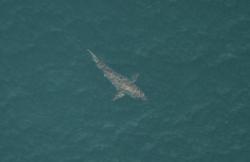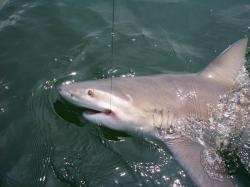Sharks!
By Frank Sargeant, Editor
from The Fishing Wire
OK, folks, which part of this are we not getting?
There are a whole bunch of sharks right now on the beaches of the Carolinas, probably because of the annual baitfish run, which has brought a lot of small blues and other fish into the surf, which in turn has put feeding sharks very close to shore.
If you swim where there are a lot of feeding sharks, the odds that you will get bitten are not, as shark apologists keep telling us, much smaller than the chance you will get hit by lightening or the odds that you will get in an auto accident on the highway.
White sharks get most of the bad press when it comes to shark bite, but they’re actually rarely involved in incidents along East Coast beaches. (Florida FWC Photo)They are relatively good. Or bad, actually, considering the result of even an “exploratory” bite by a shark of just about any size beyond a pup.
When the apologists, who want to let us all know that, hey, sharks wouldn’t really want to bite people, it’s all just a mistake, talk about shark bite odds, they conveniently ignore the fact that EVERYBODY is exposed to lightening anytime they’re outside anywhere across the nation. And that virtually everybody in America is also exposed, on a daily basis, to auto accidents.
That’s not the case with sharks–a relatively few people are fortunate enough to vacation on the beaches, and they are in the water for only a few hours a day. On the basis of exposure, shark bite is not so rare as some would have it seem.
A 17-year old was bitten Saturday at Cape Hatteras National Sea Shore, the second attack in two days, and the sixth along Carolina beaches in the last two weeks. It’s one of the more remarkable runs of attacks in any area of the U.S. coast in modern history.
Does this mean that sharks are actually vindictive creatures hungering for human flesh and patrolling swimming beaches with an eye out for tasty legs and feet?
Of course not.
What it means is that sharks are wild, predatory animals which feed opportunistically, like most predators–if they did not, they would not survive. Opportunistic feeding includes a willingness to take a bite now and then of unknown but potentially-edible food sources, including human appendages temptingly dangling where the shark is already in a feeding mood due to other food in the water–and where the visibility is not all that good to begin with.
Some are calling for an end to shark fishing off piers in the area, but sharks in the numbers that are showing up on the Carolina beaches do not appear magically when a couple of guys start tossing baits in the water. The sharks are there because of large natural food sources, and they will be there until that food moves on, which it surely will in short order–nothing stays put in the ocean except the reef species, and even they migrate seasonally.
Bull sharks are the bad boys of nearshore waters, frequently prowling into the surf and sometimes traveling well up coastal rivers. They often feed in areas where beach-goers are present. (Frank Sargeant Photo)Another strategy that won’t work is killing sharks in areas where the bites have occurred. The shark that bit a swimmer at Hatteras today may be 50 miles north or south by this time tomorrow. The fact that more bites occur in close proximity do not mean that a “rogue” shark is hunting humans, it simply means that there is a pretty dense population of sharks in the area.
Bottom line is that sharks must be treated like grizzly bears and African lions and other dangerous predators with the capability to prey on whatever wanders into their habitat.
Don’t swim where sharks are known to be concentrated, and particularly not where they are seen feeding–a shark close to the beach is almost always there because of a food source–otherwise, they want more water under their bellies.
Don’t swim where visibility is poor–any animate object that pops suddenly into a shark’s view at close range may draw a reflex bite.
Don’t swim in low light conditions–see above. Also, many sharks prefer to feed in low light, when their sense of smell and movement gives them an advantage over prey that needs sight to avoid them.
And don’t be misled into the idea that sharks are simply Bambi without the antlers, promoted to some extent by YouTube videos that show intrepid divers handling them. A shark not homed in on food and in crystal clear water is a whole lot less dangerous than one where there’s fish blood, wave action and clouded visibility.

